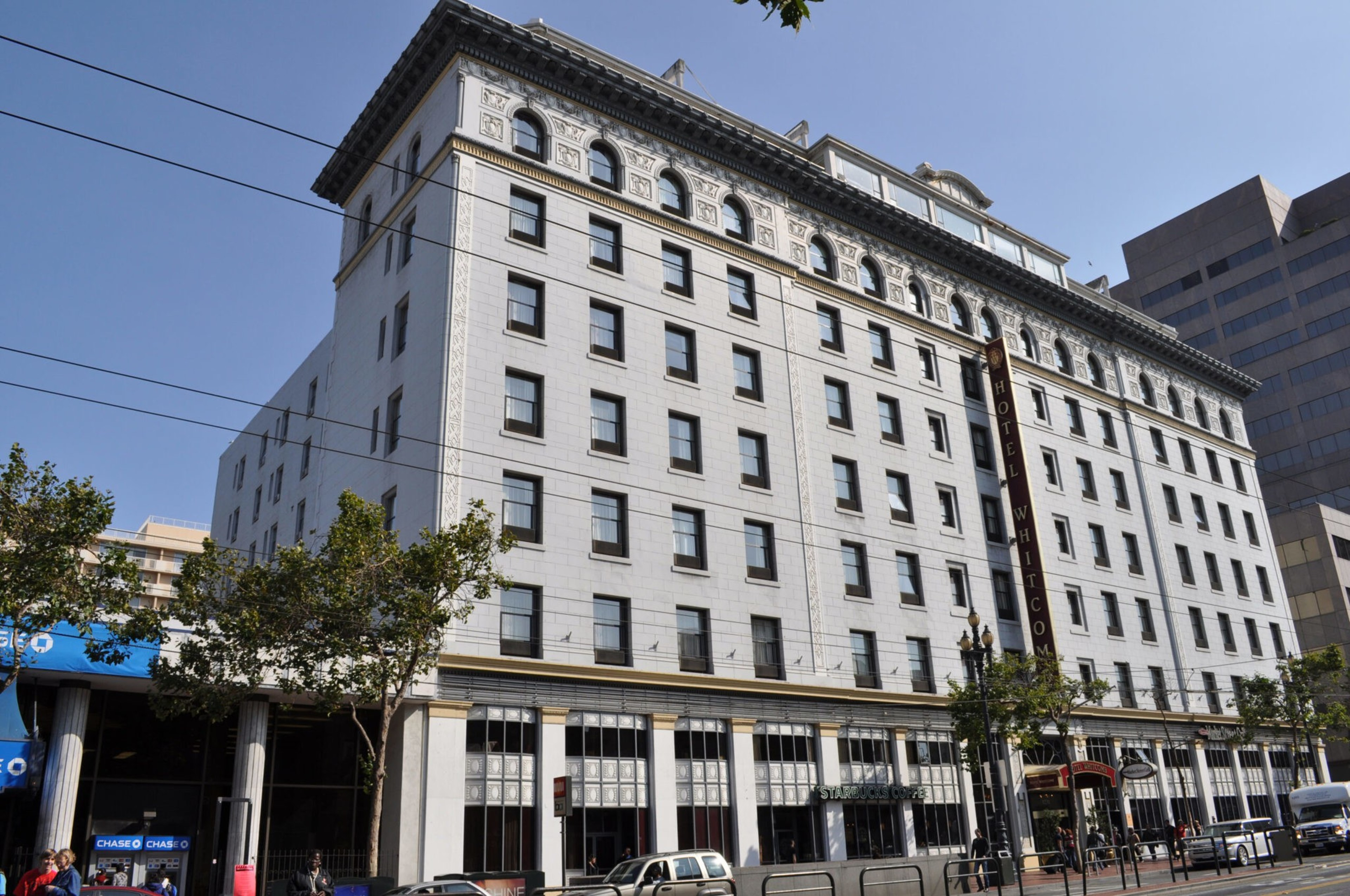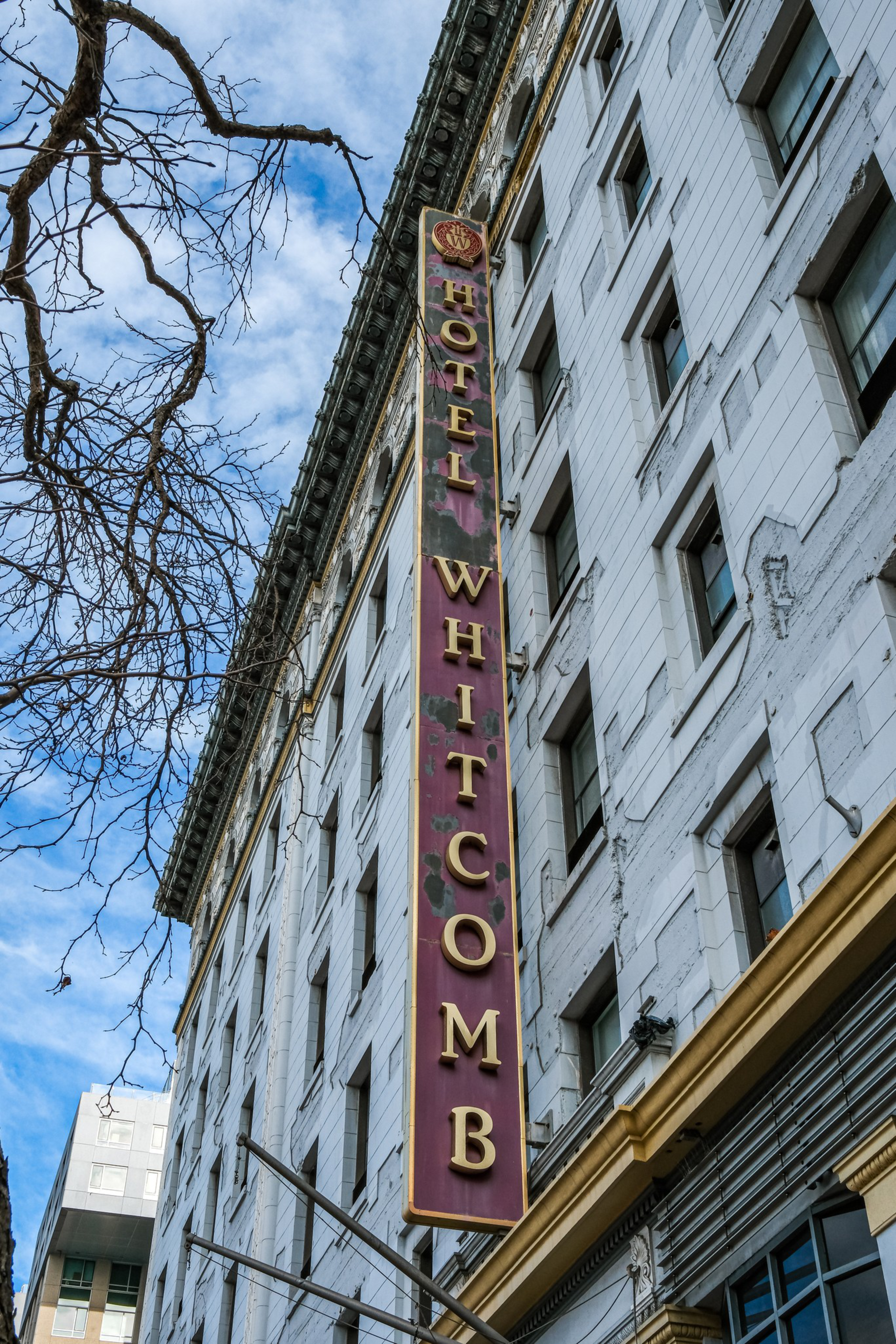After five years of uncertainty — during which it was boarded up, vandalized, trash-strewn, and left for dead — the once-vibrant Hotel Whitcomb in San Francisco’s beleaguered Mid-Market has a path toward reopening.
Global investment firm Blackstone will move to foreclose on the 459-room property this week and take control from absentee owner RFR Holdings, according to sources. RFR, the New York real estate firm co-owned by Aby Rosen, had been an impediment to the hotel’s reopening after charging the city millions for damages but never renovating the place.
The planned foreclosure comes a year after RFR and Blackstone unsuccessfully tried to sell the eight-story property for nearly half the 2018 purchase price of $130.7 million. They marketed it as a “blank slate” requiring a full-scale renovation. At that time, the three-star hotel at 1231 Market St. was a reliable option for out-of-town travelers, and its restaurant and event spaces were frequented by politicians and local workers.
That changed in 2020 when RFR agreed to participate in a program to house San Francisco’s homeless population during the pandemic. The 33-month period in which the Whitcomb was used as a shelter was marked by chaos: There were 21 overdose deaths inside the hotel during the program’s run, according to the chief medical examiner.


The property has remained closed ever since, making it a drag on both companies’ books and a blight on the surrounding neighborhood, which encompasses the theater district and City Hall.
Without the Hotel Whitcomb activating the street, the area of 8th and Market streets, just outside the Civic Center BART Station, has struggled with public safety issues and a lack of foot traffic, local merchants say. Last month, a group of office brokers even tried to rebrand the neighborhood as “Lower Hayes” to make it more attractive to AI tenants.
The Standard found that the city paid RFR a total of nearly $108 million in contracts and settlements after the temporary conversion of the hotel to a shelter. The owner never filed renovation permits after receiving those payments.
A spokesperson for RFR declined to comment. Rather than hand the property directly back to Blackstone, RFR is said to be cooperating in a nonjudicial foreclosure, which means it won’t contest the forthcoming default and public auction, at which Blackstone will make a “credit bid” for the property to take full control.
Once Blackstone takes possession of the property in the coming months, sources said, it will explore bringing in new operators for the hotel in an effort to steward it to recovery before trying to offload it to a permanent buyer.
The hotel may or may not reopen at the time of a sale, depending on the progress of the extensive repairs necessary to bring it back to operation.
According to documents filed with the city in June, Blackstone Mortgage Trust, Inc., the company’s publicly traded real estate investment trust (REIT) and the lender to the property, transferred the loan to one of its wholly-owned subsidiaries, which could indicate BXMT is engaging in a transaction to resolve the loan.
“This is a small asset which we wrote down starting in 2023,” a Blackstone Mortgage Trust spokesperson said. “As the largest owner of commercial real estate globally, we are well-positioned to take steps we believe will maximize value for our investors.”

Sources say that even though the default might negatively affect RFR’s credit, the maneuver was meant to allow Blackstone to avoid union obligations negotiated with Unite Here Local 2, which represents the hotel’s former staff, most of whom lost their jobs when the Whitcomb closed.
When a transfer of ownership occurs through foreclosure, the lender can argue that it is not a “successor employer” beholden to the previous labor contract.
Lizzy Tapia, president of Unite Here Local 2, said the union is monitoring the Whitcomb’s ownership situation and will advocate for a fair contract.
“Our members at the Whitcomb have served this city proudly for decades, including some who worked through the pandemic under very challenging circumstances,” she said. “The hotel has a responsibility to honor their commitment and sacrifices.”
